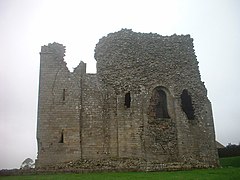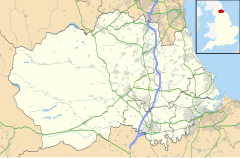Bowes
| Bowes | |
|---|---|
 Bowes Castle |
|
| Bowes shown within County Durham | |
| Population | 471 (2011, including Gilmonby) |
| OS grid reference | NY995135 |
| Unitary authority | |
| Ceremonial county | |
| Region | |
| Country | England |
| Sovereign state | United Kingdom |
| Post town | BARNARD CASTLE |
| Postcode district | DL12 |
| Dialling code | 01833 |
| Police | Durham |
| Fire | County Durham and Darlington |
| Ambulance | North East |
| EU Parliament | North East England |
| UK Parliament | |
Bowes is a village in County Durham, England. Located in the Pennine hills, it is situated close to Barnard Castle. It is built around the medieval Bowes Castle.
Bowes lies within the historic county boundaries of the North Riding of Yorkshire, but along with the rest of the former Startforth Rural District it was incorporated into the non-metropolitan county of Durham for administrative purposes on 1 April 1974, under the provisions of the Local Government Act 1972.
The A66 and A67 roads meet at Bowes.
The Roman name for Bowes was Lavatrae. A Roman army station was located there.
The only pub in the village, The Ancient Unicorn, is reputed to be haunted by several ghosts. The pub has closed down as of 2014. This 17th-century coaching inn famously played host to Charles Dickens as he toured the local area. Dickens found inspiration in the village academy, which he immortalised as Dotheboys Hall in Nicholas Nickleby; and the graves of two of the people who inspired characters portrayed by the great author remain in Bowes churchyard to this day.
Until the 1960s, the village was served by Bowes railway station.
Bowes has a single primary school at the centre of the village, Bowes Hutchinson's C of E (Aided) Primary School.
Thomas Kipling (bap. 1745, d. 1822), dean of Peterborough, was born in Bowes.
John Bailey (1750–1819), mathematician and land surveyor was born in Bowes.
Richard Cobden (1804–65), the famous manufacturer and politician, was schooled in Bowes.
...
Wikipedia

